No, Michael Brown’s Stepfather Should Not Be Charged With Incitement To Riot
Michael Brown's stepfather made incendiary comments in the wake of the Grand Jury announcement, but they do not amount to a crime.
In the immediate wake of the announcement last Monday that the St. Louis County Grand Jury investigating the Michael Brown shooting, the crowd that had gathered outside Ferguson Police Department headquarters as well as other locations in the area quickly became agitated to the point where violence quickly erupted. Police cars were overturned and set on fire. local businesses were looted and set on fire, and by the end of the night the property damage in Ferguson and the surrounding area was even more extensive than it had been after August’s protests. This happened despite the fact that, in the hours prior to the announcement, Brown’s mother and father had issued a statement pleading with the crowds in Ferguson and across the country to be peaceful out of respect for their sons memory. One member of the Brown family, though, was on the ground in Ferguson and reacted far differently:
Michael Brown’s stepfather consoled the dead teen’s distraught mother after Monday’s controversial grand jury announcement and then turned to the crowd of demonstrators, saying, “Burn this motherf—er down” and “Burn this bitch down,” according to a New York Times video.
The comments by Brown’s stepfather, Louis Head, came shortly before an eruption of rage by some protesters over the decision not to indict police Officer Darren Wilson in the August shooting death of 18-year-old Brown in Ferguson, Missouri.
A row of businesses on West Florissant Avenue, a major thoroughfare in the St. Louis suburb, was engulfed in flames Monday night. Police cars and vehicles at a nearby dealership were turned into fireballs. There were so many blazes that firefighters couldn’t reach every one.
In The New York Times video, Brown’s mother, Lesley McSpadden, is visible in the crowd Monday night in Ferguson.
McSpadden speaks to the crowd briefly, saying she has lived in the community her whole life and never experienced anything like this.
“I don’t do nothing to nobody,” she said, crying uncontrollably and placing her hands over her face. Head comforts her before his outburst.
Shouts of “F— the police” can be heard from the crowd.
CNN is trying to reach Head for comment.
His words were markedly different than those of Michael Brown Sr., who recorded a public service announcement last week, saying that “destroying property is not the answer.”
And Monday night the family released a written statement that read, in part: “We respectfully ask that you please keep your protests peaceful. Answering violence with violence is not the appropriate reaction. Let’s not just make noise, let’s make a difference.”
St. Louis Alderman Antonio French told CNN Tuesday that he was nearby when Head made the statements.
“I think he was expressing a sentiment that a lot of folks in that crowd felt and when he said those words, the mood did change and things got a little bit out of control,” French said. “There is such anger and emotion around this case.”\
Here’s the full video of what happened in those moments after District Attorney McCulloch announced the outcome of the Grand Jury investigation, with Head’s comments coming shortly after the 3:00 mark. Be warned that the video is laced with unedited NSFW language:
Now, police are reportedly investigating whether or not Head should be charged with incitement to riot:
Police have not spoken to Head about his actions, but they intend to do so, Jackson said Tuesday, adding that multiple law enforcement agencies were involved in the investigation.
The police chief told TV and radio host Sean Hannity something similar Monday, but he didn’t classify the probe as formal.
“We are pursuing those comments, and there’s a lot of discussion going on about that right now, but I really can’t get into that at this time,” he said.
But police aren’t singling out Head, Jackson told Hannity.
“We can’t let all that happened in Ferguson and Dellwood and the community die. Everyone who is responsible for taking away people’s property, their livelihoods, their jobs, their businesses — every single one of them needs to be prosecuted to the fullest extent of the law,” he said.
Police have not spoken to Head about his actions, but they intend to do so, Jackson said Tuesday, adding that multiple law enforcement agencies were involved in the investigation.
The police chief told TV and radio host Sean Hannity something similar Monday, but he didn’t classify the probe as formal.
“We are pursuing those comments, and there’s a lot of discussion going on about that right now, but I really can’t get into that at this time,” he said.
But police aren’t singling out Head, Jackson told Hannity.
“We can’t let all that happened in Ferguson and Dellwood and the community die. Everyone who is responsible for taking away people’s property, their livelihoods, their jobs, their businesses — every single one of them needs to be prosecuted to the fullest extent of the law,” he said.
McSpadden, who was standing next to Head when he made the comments and herself told the crowd she’d never experienced anything like this, offered some context in a CNN interview last week.
After hearing the grand jury’s decision, McSpadden said she felt like she’d been shot herself and her “emotions were raging.” Head was angry, too, she said.
“He just spoke out of anger. It’s one thing to speak, and it’s a different thing to act. He did not act. He just spoke out of anger,” she said. “When you’re that hurt and the system has did you this wrong, you may say some things as well. We’ve all spoke out of anger before.”
(…)
St. Louis County Police also said Tuesday that they were looking into Head’s comments. Police will present their investigation to prosecutors once its complete, police spokesman Brian Schellman said.
But is it a case prosecutors would pursue?
It’s unlikely, CNN law enforcement analyst Tom Fuentes said.
“I think they’ll have a hard time proving that somebody that heard him in the midst of all that noise actually went over and did an arson or committed an act of starting a fire. I think most of the people you see in the crowd are not watching CNN. They’re not watching media reporting of him saying that,” he told “The Situation Room.” “So it is probably very few people that heard it at that time.”
Also, Fuentes said, it’s likely many people who’d gathered in Ferguson as the grand jury’s decision was announced were already determined to act.
“I think the cause and effect of his words will be hard to prove,” Fuentes said.
Hostin, a CNN legal analyst, said prosecutors should also weigh what impact charging Head could have on the community.
“I think any prosecutor that looks at a case like this, given what is going on, what has gone on in Ferguson, would never touch this case,” she said. “You would have to be really tone deaf to the larger issues that are at play here to bring a case like that.”
Just today, Head himself spoke for the first time since that Monday night, apologizing for the tone of his comments and blaming them on the emotions that had been whipped up by the District Attorney’s announcement. Given the nature of all that has happened in this case, I tend to take Head at his word and his apology seems sincere to me but the announcement that his initial remarks are being investigated does raise some serious legal issues that ought to be looked into. Specifically, the question of when speech crosses the line from protected utterance to speech that can be legally punished is one that the Supreme Court struggled with for the better part of the 20th Century. Perhaps most infamously, in Schenck v. United States, the Court, in an opinion drafted by Justice Oliver Wendell Holmes Jr. upheld the conviction of men who were distributing literature urging men to refuse to comply with the draft during World War One because it amount to a “clear and present danger.” This was the case in which Holmes came up with his famous dictum that freedom of speech does not mean that one can “shout Fire! in a crowded theater,” thus causing a panic. In a subsequent case, Abrams v. United States, the Court upheld the conviction of men who were passing out leaflets protesting sending American troops to Russia to fight Bolshevik forces during the Russian Revolution, again using the “clear and present danger” standard, although this time Holmes dissented from the majority and argued that what these men were doing was a mere expression of opinion that did not pose the same danger as the speech in Schenck. In 1927, in Whitney v. California, the Court greatly expanded the “clear and present danger” test by holding that the state had the authority to punish those who ”by utterances inimical to the public welfare, tending to incite crime, disturb the public peace, or endanger the foundations of organized government and threaten its overthrow.”Some twenty-five years later, in Dennis v. United States, the Court upheld the conviction of a group of men and women under the Smith Act, which outlawed speech advocating the violent overthrow of the government, due to their membership in the Communist Party. Justice Hugo Black, who was one of only two Justices in dissent, argued in a passionate defense that there was no evidence that any of the Defendants had committed a single overt act aimed at overthrowing the government and that their speech should have been protected.
It wasn’t until 1969 that the Supreme Court finally began to rein in the wide latitude it had given to the state when it came to punishing speech that allegedly incited lawless action. In Brandenburg v. Ohio, the Court struck down the conviction of a leader of a branch of the Ku Klux Klan in central Ohio who had been convicted under Ohio law for a speech in which had allegedly called for action of some kind against African-Americans, Jewish-Americans, and others. In doing so, the Court established a three part test that stands to this day as the standard for when speech crosses the line from protected speech to something that can potentially be punished. In short, the Court ruled that such speech is protected by the First Amendment “except where such advocacy is directed to inciting or producing imminent lawless action and is likely to incite or produce such action.”
Based on this standard, which has stood largely unmodified by subsequent Court rules for the past 45 years, it seems pretty clear that Head most certainly should not be convicted and, therefore, should not be charged with a crime. As a preliminary matter, given the emotionally inflammatory nature of the immediate aftermath of McCulloch’s announcement last Monday, it seems clear that what was doing here was reacting out of emotion and grief. There’s little evidence that he intended for his words to lead to any kind of imminent action on the part of the crowd. Additionally, given the fact that he was standing in the middle of a large, noisy crowd, without a bullhorn or microphone of any kind makes it unlikely that many of the people who were in the immediate area heard what he was saying, and even less likely that people further back in the crowd and in other parts of the city where violence actually started heard about it. Yes, it was recorded on video, but that video was not being broadcast and, even if it was, it doesn’t appear that many people would have had the means to see the broadcast. So, judging this based on the three prongs of the Brandenburg test — intent, imminence, and likelihood — it seems clear that there is no way that prosecutors would be able to make a clear case against Head in this situation.
Paul Cassell, meanwhile, notes the problems prosecutors would have establishing a causal connection between Head’s remarks and the riots that followed:
More seriously, it not at all clear how prosecutors would show that Head violated specific laws “with force or violence.” According to a Missouri criminal law treatise, the Missouri cases “on the crime of rioting are mostly of nineteenth century vintage, and generally hold that more than mere presence is required for a conviction for rioting: the prosecution must prove that the defendant was part of the assembly and that he or other members of the assembly did in fact commit an illegal act with force and violence.” Missouri Criminal Law section 43.1 (2d ed. current through June 2014, Robert H. Dieker ed.) There is apparently an enhancement for rioting if the conduct was motivated by race, sex, religion or other “hate crime” criteria.
Prosecutors will have a quite difficult time making out a viable case of rioting against Head because of his lack of participation in looting and other specific criminal behavior. No doubt, riots followed Head’s remarks, although showing causality would be challenging. But Head did not participate in any violent acts, which appears to be a specified element of the offense.
In any event, even if prosecutors could find a way to lodge charges against Head for rioting (or some other crime, such as conspiracy), to my mind prosecutors would be well advised to devote attention elsewhere, as a matter of both policy and justice.
With regard to what is wise prosecutorial policy, the St. Louis County Prosecuting Attorney’s Office will have more than enough business in the foreseeable future simply handling the prosecution of rioters who were apprehended. More than 100 persons have been arrested on various charges after the grand jury’s decision, and many of these persons have apparently obtained sophisticated legal representation. If persons have been arrested in the act of looting, they have committed at least the felony of second degree burglary — and perhaps more serious crimes if they broke into an occupied building or if they actually set fire to a structure. In contrast, the riot statute provides that Head’s maximum culpability would be for, at most, a misdemeanor offense. Prosecutors no doubt have bigger fish to fry.
Head’s remarks were inappropriate, as he himself has acknowledged, but they were made in the heat of passion at what seems like the end of a legal process that his family has been a part of in the three months since Michael Brown died. To that extent, the passion is both understandable and excusable. More importantly, though, it should not be treated as a crime.
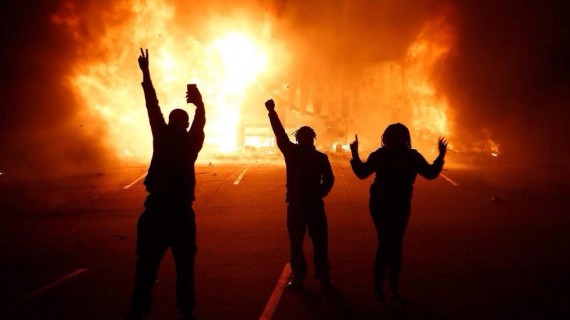

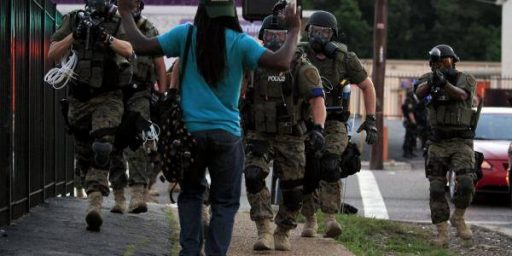
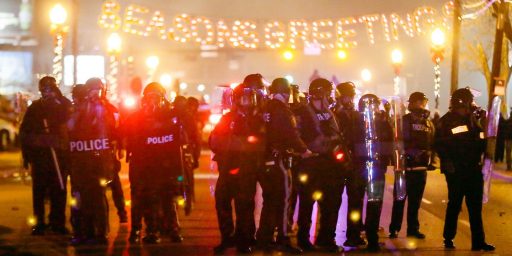
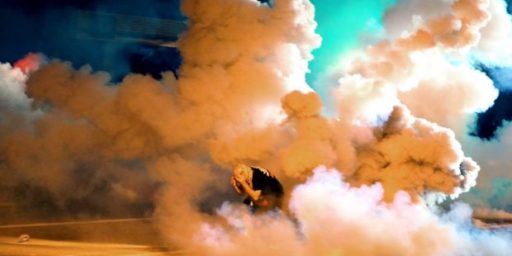
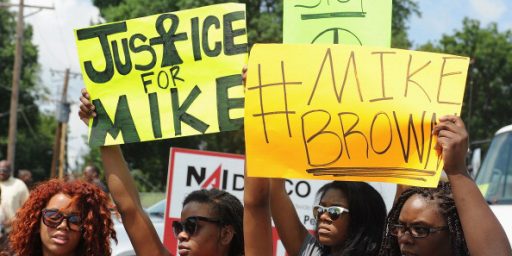
Thanks for the bit of legal history. The shout fire in a crowded theater thing always sounded pretty common sense. I had no idea that Holmes had created the phrase to inappropriately describe a case of political speech that presented no threat of imminent danger. And by so doing kind of screwed up the whole concept of free speech.
All I can think of in this instance is Prosecutorial Discretion.
Can you imagine the Ferguson community and nationwide reaction if Brown’s stepfather was charged and eventually found guilty? The result would be the equivalent of dropping napalm on the fire, after you attempted to suppress the fire by pouring gasoline on it.
So, make “threats” towards an ex spouse via Facebook that result in no harm–conviction, but suggest “burn this B1tch down” among a crowd of willing participants exploiting pent up anger, and “made in the heat of passion” that may have directly contributed to the burning of ~24 businesses–no charges?
I guess that attending a Ku Klux Klan meeting and during a discussion about Al Sharpton someone says “Hang that niqqer” that results in his hanging is simply, to use Doug’s words, appropriate?
@Jack: Did you read Doug’s post?
@al-Ameda: If they choose to pursue this, it would seem to confirm our worst opinions of the police and prosecutors.
@gVOR08: In its entirety.
@gVOR08:
Is such a confirmation really necessary at this point?
Can we also discuss the no indictment in the Garner case? I understand that the Brown incident was fairly complex, and open to interpretation, but this…I don’t know what to call this other than despicable. Just unbelievable.
@gVOR08: Why? Because they prosecute criminals?? The sheer gall of them.
@Jack: You read this?
“Based on this standard, which has stood largely unmodified by subsequent Court rules for the past 45 years, it seems pretty clear that Head most certainly should not be convicted and, therefore, should not be charged with a crime.”
@CB:
Well, Eric Garner was suspected of selling untaxed cigarettes. Surely this merits a violent physical attack by the police.
@gVOR08: Yes, I read that. Did you read my post?
@anjin-san: Selling untaxed cigarettes in NYC is the equivalent of negligent homicide everywhere else.
Garner, Crawford and Tamir Rice are egregious examples.
But what i don’t get is that if you can’t yell “Fire” in a crowded theatre, how can you call 911 and blatantly lie as Ronald Ritchie did, directly causing the circumstances of John Crawford’s death?
http://www.inquisitr.com/1511916/walmart-shooting-video-ronald-ritchie/
Jack, Jenos, Bill, Florack – any of you want to defend this?
Why isn’t Ronald Ritchie being charged with a crime? Because if what he did isn’t illegal, it should be.
@Jack: I did actually. It seemed to ignore everything Doug said.
@EddieInCA: Ritchie should be in jail, and sued for every nickel he has. But how do the cops get to shoot someone based on unconfirmed information from some random yahoo with a cell phone?
@EddieInCA: I agree with you. What Richie did was a crime. But, the crime the police committed in that case was even more egregious. They failed to do anything to confirm the 911 call before gunning him down.
@gVOR08: I also read this.
@Jack: Which Doug addressed. Convincingly.
I’m glad we agree about the Beaver Creek cops.
Last iteration.
@Jack: Most, if not all, the cases Doug is referencing are incitement cases. A incites B to commit a crime against C. It is assumed that B is criminally liable, but is A? And is A criminally liable in the absence of B committing a crime against C?
I’m not sure of the specifics of your Facebook reference, but that is A threatening B, usually considered misdemeanor assault. More of a fighting words issue I think.
@PD Shaw: It was yesterday’s post. See here.
https://www.outsidethebeltway.com/supreme-court-searches-for-dividing-line-between-free-speech-and-illegal-online-threats/
@gVOR08: That may be an unfair judgment on Holmes. When the First Amendment was passed, the common view was that it only prevented “prior restraints.” The government could not prevent speech, but it could impose consequences for speech.
The Schenck decision was the first time the SCOTUS set limits on government punishment of speech, even though it found those limits didn’t protect this particular speaker. (The background is interesting because Holmes initially wrote a dissenting opinion that troubled the other justices enough that they let him write the majority opinion, so long as it the conviction was upheld.)
@Jack: I didn’t read about that one. It may be a subtle distinction but that case sounds more like the Westboro Baptist church case from a few years ago. The father of the dead soldier saw the protest outside the cemetery on t.v., but this was too remote to allow an intentional infliction of emotional stress claim.
@PD Shaw: “When Barkley talks, people listen”
I think you’ve driven off the deep end. If you have accurately described the Brandenburg test, this case clearly meets the standard for criminality established by the court.
Was it intended to incite lawless behavior? Absolutely. It is obvious on it’s face. He was literally exhorting the crowd to commit mass arson. He stated it as a grammatical imperative. He could not be more clear.
Was it likely to result in violence? Absolutely. This standard is met as clearly as any possible such test could be: The crowd actually DID follow his instructions.
Would they have rioted even without him calling for mass arson? Maybe, maybe not. But there is nothing in the legal test that requires that the incitement to riot be the ONLY factor amping up a mob.. The crowd was already amped up.
Yes, we understand he was ticked off. But nobody who’s not ticked off ever incites a riot.
This wasn’t even in the heat of the moment. Brown has been dead for months. The family received word that the grand jury didn’t indict Wilson hours before this point. This wasn’t just incitement to riot. This was premeditated.
And we don’t refuse to enforce laws simply because the howling mob doesn’t like it. The DA absolutely should prosecute for incitement to riot… and show himself on the side of the law abiding and business owners of Ferguson. If they don’t, every employer in the city should read the ti leaves and vote with their feet.
Vandalism: beautiful as a rock in a cops face
It seems that by your own description of Brandenburg
that Head rather clearly can be held accountable for inciting a riot. He urged violence in an emotional situation with an angry mob present and in clear proximity to the target of his urged violence. Further, because of his relationship to the victim, his words were likely to be taken seriously.
Head is clearly guilty here. I wouldn’t charge him simply because there’s no evidence of premeditation—he was almost certainly acting out of grief and anger—because it would be perverse to further inflict harm on the victim’s family while the killer of their loved one went free, and because it would likely further inflame an already tense situation. Discretion here is the better part of valor. But Head committed a crime, potentially with very deadly consequences, in his emotional state.
@gVOR08: ” The shout fire in a crowded theater thing always sounded pretty common sense. I had no idea that Holmes had created the phrase to inappropriately describe a case of political speech that presented no threat of imminent danger. And by so doing kind of screwed up the whole concept of free speech.”
Holmes was a dick.
@James Joyner:
Head’s words were certainly heated and arguably incendiary, but I question the extent to which they meet either the intent or “imminent lawless action” elements of the Brandenburg test. On the intent side, if they were truly an immediate emotional outburst in response to the news of the decision and the emotional state of Brown’s mother, then it becomes doubtful that Head was intending the people actually burn the city of Ferguson, or some part of it, down. Second, the video of the incident doesn’t make it at all clear that a large number of people were even listening to what he was saying, or that they needed at that point to hear anything from anyone to be stirred up into an emotional frenzy in response to the news.
The Brandenburg test is a tough one for the state to overcome, which is one reason why prosecutions for incitement have become so rare since the test was enunciated 45 years ago, and I find it hard to see how the state could overcome the burden in this case.